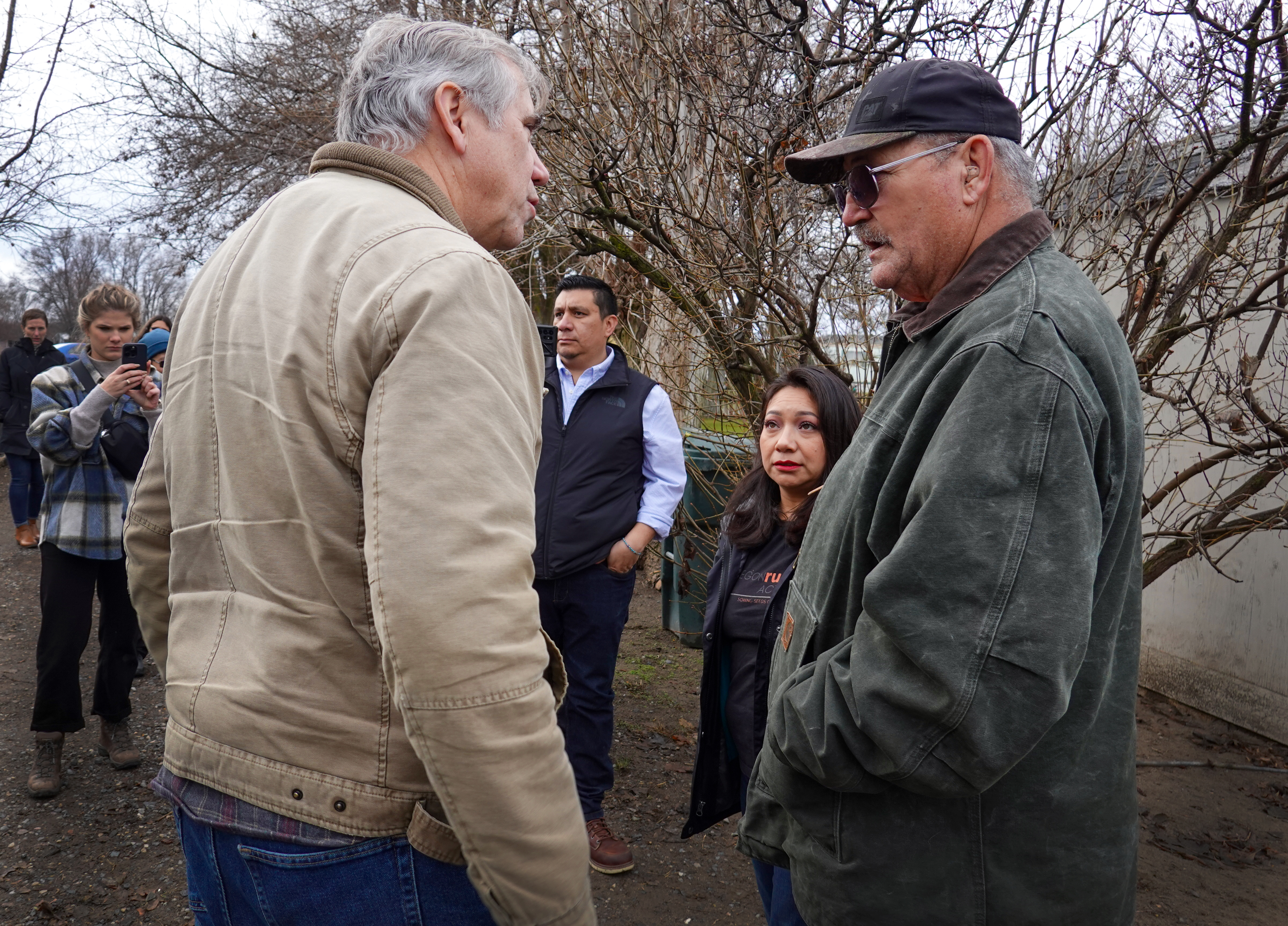
U.S. Sen. Jeff Merkley, left, speaks with rural Boardman residents Mike Pearson and Ana Maria Rodriguez in Boardman, Ore., Jan. 15, 2023.
Antonio Sierra / OPB
More than three decades into a nitrate pollution crisis, a handful of Lower Umatilla Basin residents are escalating their concerns to the courts.
Five residents living in the Boardman, Oregon, area — Mike Pearson, Michael and Virginia Brandt, and James Patrick Suter and Silvia Suter — filed a class action lawsuit in federal court Tuesday against some of Morrow County’s largest agricultural industries, which are the main contributors to nitrates in the area’s groundwater. The defendants are Threemile Canyon Farms, Lamb Weston, Madison Ranches, Beef Northwest Feeders and the Port of Morrow.
The lawsuit aims not only to secure compensation from the companies the residents hold responsible, but also to get them to foot the costs of cleaning up the groundwater and connecting residents with clean drinking water.
Many of the plaintiffs are mainstays of the tours and community meetings that sprouted up following Morrow County’s emergency declaration in 2022. Those meetings included visits from U.S. Sen. Jeff Merkley, Oregon Gov. Tina Kotek and other high-ranking state and federal officials. For many residents, the increased publicity did not result in clean drinking water.
“The Port (of Morrow) and these commercial farms have placed us and hundreds of other families in an impossible position,” Pearson said in a statement. “We can’t keep living like this.”
Among the defendants named in the lawsuit, Madison Ranches, Lamb Weston and Beef Northwest did not respond to a request for comment. Threemile Canyon and the port declined to comment while they reviewed the complaint, though a representative for the latter added that “we take any action like this seriously.”
Related: Morrow County declares emergency over high nitrate levels in wells
The plaintiffs’ legal team is being led by Seattle attorney Steve Berman, a well-known attorney who helped bring cases against Big Tobacco in the 90s. In an interview, he compared nitrate pollution in the Lower Umatilla Basin to the drinking water crisis in Flint, Michigan, where thousands of people were exposed to lead and other contaminants through the municipal water system.
“People couldn’t get access to drinking water and I think everyone was amazed,” he said. “Well, here it is, right here in our backyard.”

Fourth Generation farmer Jake Madison's farm where he grows a wide range of crops from grass seeds to wheat.
Monica Samayoa / OPB
A decades-long problem
The lawsuit provides a brief history of the Lower Umatilla Basin’s nitrates crisis.
The state first detected elevated nitrate levels in wells in the early 1990s, and in 2001, the state declared the basin a groundwater management area in northern Morrow County and western Umatilla County. As a result, Oregon formed a committee to study the issue and produce a series of voluntary measures to clean up the area’s groundwater.
The committee’s studies showed that the local agricultural industry was the biggest contributor to nitrate pollution. Whether it was irrigated agriculture fertilizing their fields, feedlots and dairies storing animal waste in lagoons or the Port of Morrow recycling wastewater for agricultural use, nitrates were seeping through the soil and into the groundwater supply. While cities have water treatment systems, people who draw water from domestic wells drink it at their own risk.
Drinking water with high nitrate levels has been linked to illnesses like cancer, thyroid disease and kidney disorders, and it’s especially harmful to infants, according to the U.S. Environmental Protection Agency.
The lawsuit details how all of the plaintiffs have been affected personally by nitrates pollution.
After Pearson’s water tested in 2022 at four times the limit set by the EPA, the filtration system he installed failed to put the water below the limit. While the state is providing his home with drinking water, Pearson said deliveries didn’t follow a schedule and weren’t enough to meet his household’s needs.
According to the complaint, the Brandt family couldn’t afford a filter and doubted it would bring their nitrate level down enough. The Suter family looked into deepening their well to access cleaner water, but a contractor told them it would cost $24,000 for the drill job.
The lawsuit highlights that much of the population of the Lower Umatilla Basin is poor, Latino or Indigenous.
“If this pollution was happening in an affluent Portland suburb, it would be stopped.” Berman said. “But these people don’t have the power that the rich do or the well-to-do in the suburban areas have. No one’s listening to them.”
Related: Port of Morrow continues to apply excess nitrates on farmland, misses payment deadline
If a judge agrees to deem basin residents a “class,” Berman said, the lawsuit could potentially add more than 40,000 plaintiffs to the case. While attorneys are asking a jury or court to determine how much money is owed to their clients, they want the local agriculture industry to take additional measures to solve the problem. Those measures include a state-certified remediation of the basin’s soil and groundwater, covering the cost of water deliveries, well digging or connection to a clean drinking water system, and a medical monitoring system for people who could have nitrate-related health issues.
Berman is confident in his clients’ case, adding that similar lawsuits have had success in Washington state and Delaware.
Basin residents haven’t just been frustrated with nitrate polluters but with the state for failing to protect them from the pollution. Berman said his clients didn’t sue the state because it could create “complications,” declining to say what those legal hurdles were. But, he added, the lawsuit could spur the state to take more action.




